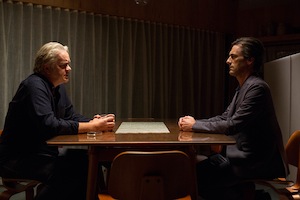Directed by Michael Almereyda
Country: USA
Michael Almereyda’s filmmaking style was never easy to catch up. His past films, regardless amazing premises, usually fell into torpid atmospheres and narrative impasses. “Nadja”, “Hamlet”, and “Cymbeline” are elucidative examples of potentially good stories that fail to deliver in the end. Even though, I was able to give him some credit a couple of years ago, when “Experimenter” came out.
Now he’s back with “Marjorie Prime”, a thoughtful and psychological science-fiction drama that truly fits the current times, and which I consider his best work to date.
Almereyda starts by introducing us Marjorie (Lois Smith), an 86-year-old former violinist who apparently is experiencing some trouble with her memory. While we, the viewers, immediately suspect of Alzheimer disease, she sits and talks with a computerized hologram (a Prime) of her husband, Walter (Jon Hamm), who exhibits the same physical aspect he got when he was 40. It was Marjorie who chose this version of him to facilitate and stimulate their communication. He basically keeps repeating old family stories over and over again while studying carefully her reactions. From their warmish conversations, sometimes perplexingly formal, we learn that Marjorie has a daughter, Tess (Geena Davis), whose husband, Jon (Tim Robbins), she was never fond of. After Tess and Jon are brought to the stage, we realize that, just like Walter, Marjorie is a Prime.
At an early stage, we see that Jon struggles with a drinking problem aggravated by pills. While under their effect, he unburdens his mind by embarking on private, often bitter, conversations with the attentive yet icy Walter, in which he revisits forbidden past occurrences like the death by suicide of Tess’ brother, Damian, who left an indelible, painful mark on everyone’s chest.
In a similar way, Tess attempts to open up with the figure of her dead mother, but in a more reserved way. She furnishes some more information to Marjorie’s Prime, who avidly absorbs everything fast and clear, even when the info is scarce and feels slightly devious. At this point, we discover another scar in the family as Tess talks about an estranged daughter who refuses to talk to her.
If the story wasn't intriguing enough to keep us searching for the core of the problem, we unexpectedly realize that the real Tess is also dead, and the person we see is just another Prime, who listens, processes, and apprehends information only to mold itself and behave according to the expected. This hired, disturbing tech chain of ultra fast assimilation and response takes us to a dissimulated reality of a painful solitude and apparent well-being. Things get a bit more real and clear whenever Jon becomes ‘tipsy’, as he likes to call it.
Anticipating the disconcerting finale, both ironically funny and achingly sad, we can observe a debilitated, aging Jon taken care by his granddaughter, also called Marjorie. This is a particularly important scene, a crucial passage that helps us understand the desolation of the whole scenario.
By focusing on a complex theme and approaching it through simple processes, Almereyda mounts a gloomily visionary tale that besides dealing with loss, also warns us about the unstoppable advances of modern technology to apparently suppress people from feeling more and more lonely. “Marjorie Prime”, which has a play by Jordan Harrison as its source, is a no-nonsense exercise full of demonstrative close-ups, in which deceitful specters are imagined to ease empty, lost souls.




























































